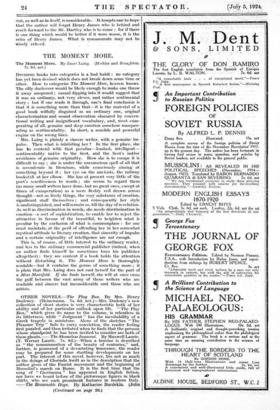THE MOMENT MORE.
DIN/Longo books into categories is a bad habit : no category has yet been devised which does not break down some time or other. How to categorize The Moment More, heaven knows. The silly dustcover would be likely enough to make one throw it away unopened ; casual dipping into it would suggest that it was an ordinary, not very clever, and rather sentimental story ; but if one reads it through, one's final conclusion is that it is something more than that—it is the material of a good book wilfully disguised as an ordinary one, original characterization and sound- observation obscured by conven- tional writing and insignificant vocabulary, and, most exas- perating of all, genuine and deep emotion somehow masquer- ading as sentimentality. In short, a sensible and powerful engine on the wrong lines.
Mrs. Laing is plainly a sincere writer, with a genuine im- pulse. Then what is. inhibiting her ? In the first place, she has to contend with that peculiar—leashed, intelligent— sentimentality- native to the Scot, and the Scot's native avoidance of genuine originality. How she is to escape it is difficult to say ; she is under the unconscious spell of all that is second-rate in literature, while consciously aiming at something beyond it ; her eye on the ancients, the railway bookgtall at her elbow. She has at present very little- of the poet's sensitiveness to words ; she seems to regard them (as many small writers have done, but no great ones, except at times of exasperation) as a mere fleshly veil drawn across • thought—not as lively things, the very substance of creation, significant stuff themselves ; and consequently her style is undistinguished; and will remain so, till the day of revelation. As well as discrimination in words, she needs discrimination in emotion—a sort of sophistication, to enable her to reject the attractive in favour of the beautiful, to heighten what is peculiar by the exclusion of what is commonplace : for one must maintain, at the peril of offending her in her somewhat mystical attitude to literary creation, that sincerity of impulse and a certain originality of intelligence are not enough.
This is, of course, of little interest to the ordinary --reader, and less to the ordinary commercial .publisher (indeed, when an author finds himself he sometimes loses his 'publisher altogether) ; they are content if a book holds the attention without disturbing it. The. Moment More is thoroughly readable—but it contains the germs of something more ; it is plain that Mrs. Laing does not cast herself for the part of a Miss Manifold. If she finds herself, she will at once cross the gulf between the vast army of those writers who are readable and sincere but inconsiderable and those who arc artists.


















































 Previous page
Previous page